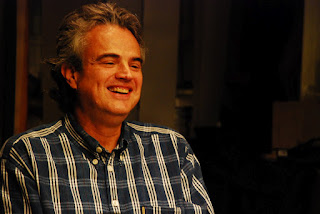
Natural de Ribeirão Preto, no interior de São Paulo, Guilherme de Almeida Prado não é apenas um dos melhores e mais talentosos diretores do cinema brasileiro - mas também uma das escassas pessoas que realmente gostam, entendem e trabalham em prol de seu
métier: é um dos poucos, senão o único no Brasil, que não se deixou contaminar por modismos, afetações e clichês, e a realmente fazer filmes
fílmicos -
onde a experimentação dialoga facilmente com o senso de humor e a diversão mais descompromissada - e constantemente trabalhar e procurar avançar a linguagem do cinema.
O mais curioso é que esse engenheiro civil, com formação pela Universidade Mackenzie, na capital paulista, jamais chegou a formalmente estudar cinema , e teve sua escolaridade e aprendizado literalmente em
sets de filmagem na Boca do Lixo, o notório reduto da produção cinematográfica no centro de São Paulo, seja como assistente de figuras como Ody Fraga, David Cardoso e Luiz Castellini, até sua estreia de fato no longa-metragem com o sucesso de bilheteria "As Taras de Todos Nós". E mais curiosamente ainda, soube evoluir para um estilo de cinema muito próprio, pessoal e sofisticadíssimo - em filmes como "Flor do Desejo"; "A Dama do Cine Shangai"; "Perfume de Gardênia"; "A Hora Mágica" e mais recentemente "Onde Andará Dulce Veiga?", baseado em livro de seu amigo Caio Fernando Abreu. "Ele é meu mantra, um dos meus heróis, uma das pessoas que mais entendem de cinema que já conheci: foi uma escolha natural levá-lo para o "É Quase Verdade" dando um depoimento matador", diz o diretor Emanuel Mendes. "Além disso, não é sempre que podemos conhecer nossos ídolos, e melhor ainda, ficar amigo deles", completa Emanuel. Por tudo isso, Guilherme acabou recebendo a alcunha de
cineasta cinéfilo, graças à publicação do
livro que leva seu nome lançado pela Coleção Aplauso, e, principalmente, na outra publicação da mesma coleção com o roteiro de seu mais recente filme. Nela, Guilherme solta o parecer mais preciso sobre sua arte, e o que significa, para ele, o cinema: " Muitas pessoas torceram o nariz ao assistir o "Onde Andará Dulce Veiga?", rotulando o filme de pessoal e na contramão. Pessoal todos os meus filmes o são. Sou incapaz de fazer filmes de outra maneira. Gostaria de não estar na contramão, mas neste momento em que o cinema brasileiro me parece tão de olhos no passado, tentando repetir fórmulas dos gloriosos tempos do
Cinema Novo, fico orgulhoso de estar na contramão, de olho no futuro do cinema."
Born in Ribeirão Preto, in the São Paulo countryside, Guilherme de Almeida Prado is not only one of the best and most talented film directors working in Brazilian cinema, but also one of the few people who really appreciate, understand and work for the film medium like no other: he is probably one of the fewest, if not the only one in Brazil, who hasn´t been affected by trends, fashions and clichès, and the one who really makes filmic films - where experimental language smoothly dialogues with his sharp sense of humor and the ever shallow entertainment elements as a whole - and constantly work on film language and film sense without falling in the opening and cozy arms of conventionalism. The curious thing is that this civil engineer - who graduated from Mackenzie University in São Paulo - has never really studied Film, but had his apprenticeship and training on real film sets at the Boca do Lixo region in São Paulo downtown in the 1970s, working as director assistant for Ody Fraga, David Cardoso and Luiz Castellini, before making his first and most successful feature film "As Taras de Todos Nós". And curiously enough, he learned how to grow to more personal and sophisticated films such as "Flor do Desejo", "The Lady From The Shangai Cinema", "Scent of Gardenia", "The Magic Hour" and more recently "Whatever Happened to Dulce Veiga?", based on the book by his writer friend Caio Fernando Abreu. "He is my mantra, one of my heroes, one of the fewest people I know who really appreciates and like the cinema: it was a natural choice to cast him for "It´s Almost True" to give a truly defining line of what it is like to make movies in Brazil and Latin America", says director Emanuel Mendes. "Besides, it´s not always one gets the chance to know his/her idols, and better still, make friends with them", completes Emanuel. For all this, Guilherme has received the term cinephile filmmaker, thanks to the publishing of a book on the director´s life and even more due to the other book covering the detailed script for his latest achievement. In it, Guilherme gives the most precise thinking about his art and what it means to him the cinema itself: "A lot of people got upnosed about "Whatever Happened to Dulce Veiga?", stating the film was personal and playing against the rules. Well, personal is something my films have always been. I am unable to make them differently. I would seriously like not to be playing against the rules, but at this very moment, when Brazilian Cinema seems to be looking at its past, trying to repeat formulas from the glorious days of the Cinema Novo movement, I am happy and proud to be playing against the rules, to be looking at the future of cinema."
Este post é totalmente verdade. This is a totally true post.


